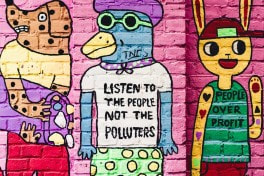 Photo by ev on Unsplash
Photo by ev on Unsplash In September 2015 the United Nations General Assembly adopted the 2030 Agenda for Sustainable Development, setting forward 17 Sustainable Development Goals, with no less then 169 targets to be achieved by 2030. What progress has been made since?
The 2020 Report notes that progress had been made in some areas, such as improving maternal and child health, expanding access to electricity and increasing women’s representation in government. Yet these advances were offset elsewhere by growing food insecurity, deterioration of the natural environment, and persistent and pervasive inequalities.
COVID-19 pandemic disrupts SDG progress
Now, in only a short period of time, the COVID-19 pandemic has unleashed an unprecedented crisis, causing further disruption to SDG progress, with the poorest and most vulnerable affected the most.
Key findings
The report also shows that climate change is still occurring much faster than anticipated. The year 2019 was the second warmest on record and the end of the warmest decade of 2010 to 2019. Meanwhile, ocean acidification is accelerating; deforestation and land degradation continues; massive numbers of species are at risk of extinction; and unsustainable consumption and production patterns remain pervasive.
As the pandemic has disrupted the world’s progress towards the SDG’s, increased action by all actors will be needed in order to attain the global goals by 2030.
COVID-19 pandemic disrupts SDG progress
Now, in only a short period of time, the COVID-19 pandemic has unleashed an unprecedented crisis, causing further disruption to SDG progress, with the poorest and most vulnerable affected the most.
Key findings
- An estimated 71 million people are expected to be pushed back into extreme poverty in 2020, the first rise in global poverty since 1998. Lost incomes, limited social protection and rising prices mean even those who were previously secure could find themselves at risk of poverty and hunger.
- Underemployment and unemployment due to the crisis mean some 1.6 billion already vulnerable workers in the informal economy – half the global workforce – may be significantly affected, with their incomes estimated to have fallen by 60 per cent in the first month of the crisis.
- The more than one billion slum dwellers worldwide are acutely at risk from the effects of COVID-19, suffering from a lack of adequate housing, no running water at home, shared toilets, little or no waste management systems, overcrowded public transport and limited access to formal health care facilities.
- Women and children are also among those bearing the heaviest brunt of the pandemic’s effects. Disruption to health and vaccination services and limited access to diet and nutrition services have the potential to cause hundreds of thousands of additional under-5 deaths and tens of thousands of additional maternal deaths in 2020. Many countries have seen a surge in reports of domestic violence against women and children.
- School closures have kept 90 per cent of students worldwide (1.57 billion) out of school and caused over 370 million children to miss out on school meals they depend on. Lack of access to computers and the internet at home means remote learning is out of reach of many. About 70 countries reported moderate to severe disruptions or a total suspension of childhood vaccination services during March and April of 2020.
- As more families fall into extreme poverty, children in poor and disadvantaged communities are at much greater risk of child labour, child marriage and child trafficking. In fact, the global gains in reducing child labour are likely to be reversed for the first time in 20 years.
The report also shows that climate change is still occurring much faster than anticipated. The year 2019 was the second warmest on record and the end of the warmest decade of 2010 to 2019. Meanwhile, ocean acidification is accelerating; deforestation and land degradation continues; massive numbers of species are at risk of extinction; and unsustainable consumption and production patterns remain pervasive.
As the pandemic has disrupted the world’s progress towards the SDG’s, increased action by all actors will be needed in order to attain the global goals by 2030.

 RSS Feed
RSS Feed